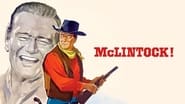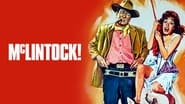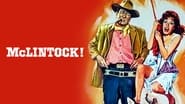Spidersecu
Don't Believe the Hype
Doomtomylo
a film so unique, intoxicating and bizarre that it not only demands another viewing, but is also forgivable as a satirical comedy where the jokes eventually take the back seat.
Orla Zuniga
It is interesting even when nothing much happens, which is for most of its 3-hour running time. Read full review
Fleur
Actress is magnificent and exudes a hypnotic screen presence in this affecting drama.
calvinnme
If the John Birch Society decided to do a Western remake of The Taming of the Shrew and got Donald Trump to direct, you'd wind up with this film.And yet I like it. As the Duke and Maureen O'Hara have moved into middle age the sparks still fly when they are on screen together. G. W. McLintock (Wayne) settled this wild western country with his young wife Kate (O'Hara) years ago, and McLintock is now a wealthy rancher. But he has problems. First off the government has given large tracts of surrounding land to some poor people so they can farm. The problem is, the land is not fit for farming. However, some crooked government agents just tell the settlers that G.W. doesn't want farmers surrounding his ranch land. His long estranged wife Kate, is back in town saying she wants a divorce. And finally, McLintock's daughter has returned home after graduating college and her boyfriend is just not masculine enough to suit G.W. (Jerry Van Dyke as Matt Douglas Jr.). To boot, Matt's dad, a blowhard politician, is making romantic overtures to Kate.G.W. is confused. He can't figure out why his wife left him, and she can't really communicate her issues very well either, although she is very good at insulting him. He still loves her, and you can tell she still loves him, mainly by the look on her face when anybody talks about "the good old days" when she and G.W. were first starting out. The film has all kinds of messages I don't like - that women are just looking for a man to stand up to them and give them a good spanking. Although these scenes are played as broad comedy, it still sends a weird message fifty years later. Then there is G.W. intending to disinherit his daughter, his only child, so she can have the joy of noble poverty and building something up from nothing which will, of course, require a man back in the old west. Then there is a pheasant hunting - more like shooting - scene that just looks too real. I'm sure People Eating Tasty Animals might not mind, but PETA probably would.What's good about it? Anytime you get Maureen O'Hara and the Duke together you have screen magic. Then there is a great mud fight scene that may be silly but it is fun watching the Duke as G.W. trying to resist his temper when one of the settlers does something macho and stupid - and that's a high bar to reach in this film - and finds he just can't do it. Mass fighting between people who don't even have a grudge against each other and sliding into a nearby mudpit ensues. Think barroom brawl here, just outside. Then there is McLintock trying to retire his current cook and hire a settler widow woman in his place. But retirement doesn't mean what it does today. McLintock tells the old cook that he'll be part of the family, living in the house with everybody else, just not having to cook anymore. Sounds like a good deal to me. So McLintock is a good boss who is fair to his employees and apparently just doesn't turn them out in the street in their old age.Maybe Wayne could see that people might have a problem with the spanking and the pheasants and the mocking of the effeminate boyfriend, and so he put in a few scenes about the bad treatment of the Indians at the time to even things out.I'm no raging feminist, so for me to get offended there must be something offensive there. Yet I'd say take it in the context of the times, enjoy the magic of the Duke and Maureen O'Hara, and just look at it as not intending to be harmful and you'll probably enjoy it. After all, the Duke had to do a comedy every few movies or he'd just become a parody of himself. And besides, Dick York was telling Elizabeth Montgomery "no wife of mine is going to work!" in "Bewitched" until the late 1960s. Although I doubt he would have ever spanked her or she would have turned him into a newt.
weezeralfalfa
Wayne's film company, Batjac, needed a sizable commercial hit that was relatively quick and cheap to produce, to make up for the financial loss from making the long expensive "The Alamo". The winner was this Western semi-farce, which included resurrecting elements of two John Ford-directed films made a decade previously costarring Wayne and Maureen O'Hara: "Rio Grande" and "The Quite Man", with the major theme based on "the Taming of the Shrew" It far outdid Ford's penchant for including some humor, especially the slapstick variety. Unfortunately, Victor McLaglen, who had instigated much of the humor in Ford's cavalry trilogy films and "The Quite Man" was no longer around, although his son was present as the director. Thus, in addition to the repeated battle of the sexes between Wayne and Maureen taken to new heights, an additional element of conflict was needed to provide for a more complex plot. Thus, in place of warring Apaches(as in "Rio Grande") or an obstinate Irish traditionalist McLaglen, in "The Quite Man", we have various characters and elements which are at odds with G.W.'s(Wayne) rugged individualism: mostly agents of misguided federal government paternalism, reflecting Wayne's view of contemporary government liberalism agendas. Examples include: Indian agent Agard, daughter Becky's Eastern college-educated boyfriend, territorial governor Humphrey(in reference to democratic presidential candidate Hubert Humphrey), and the naïve homesteaders who hope to grow crops on government give away land barely suitable for grazing cattle. In contrast, G.W. respects Jake the general store owner, because he, on a much smaller scale, represents another man who, without the aid of government largess, established a successful business. He also likes Delvin(played by Wayne's son Patrick): a young man trying to support his widowed mother and sister by working hard for G.W., and G,W.'s bait for weaning Becky away from her effete Eastern boyfriend, thus helping to convince her to return to living in his realm. Unfortunately, I find this film considerably less appealing than do many, who presumably find over-the-top slapstick hilarious. With the coming women's lib movement, this film probably closes out the era when it was considered OK and hilarious for women being difficult on film to receive a paddling from their significant other. Here, we have not just one, but two women(Maureen and Stephanie Powers, as her daughter Becky) who receive a paddling over a man's knees, functioning as a redundant gag. Yvonne De Carlo, who plays G.W.'s new cook and house maid, Louise, received a similar paddling in "Frontier Gal", where she played a rather similar fighting -mad woman to Maureen's Kate. True, these episodes were mild compared to the beatings many women have received through the ages. But, I find them embarrassing, making women appear to be more like children than adults. If I were Kate, I certainly couldn't face continued residence in that region after the public humiliation inflicted by G.W., even if I deserved it. Kate and daughter Becky clearly must be masochists, as both are 'turned on' by their spankings(as was Yvonne's character in her previous film).Unfortunately, Maureen overplays her persona as an unforgiving snobby shrew we see no possibility of reform in. Was Kate like this before she left G.W. over his suspected philandering , or is this her response to this discovery? I suspect mostly the latter. Had G.W. become a drunkard and whore supporter before Kate left him, or has he developed these evening recreations in response to her leaving? We would like to believe that these characteristics have become much accentuated as a result of Kate's discovery of lipstick on G.W.'s collar, which apparently precipitated this whole ugly situation. At one time, they must have been a very industrious and savvy team in building up a huge cattle empire, along with a mine, lumber and other businesses in a dangerous frontier region. Underneath the overt hostility, we detect a lingering caring for the other. Katie assumes that Louise was hired mostly to be G.W.'s in-house mistress in her absence. But, Louise doesn't appear to be a fighter nor drinker. Thus, G.W. will probably find her boring as Kate's replacement. G.W. and Kate are both fighters, who need to fight and make up occasionally to provide sufficient drama to their relationship. Thus, under the surface, both are hoping they can reestablish a meaningful relationship, while saving face in the process.I prefer Maureen's less extreme shrewish spitfire characters in the much shorter, obscure, films: "Comanche Territory" and "Against All Flags". You may also. She gets booted in the derriere in the former, instead of spanked.Although the historical setting for this tale is of minor importance, it appears to take place around 1874-5, when the US army was called upon to round up the remnant southern plains tribes , which were rampaging due to unfulfilled US government promises. The dictate that these tribes move onto supervised reservation lands in Oklahoma Territory is dramatized. G.W. acts as the friendly spokesman-interpreter for these tribes in their oral response, in a council with the army.
mark.waltz
The thought of former swashbuckling leading ladies Maureen O'Hara and Yvonne De Carlo duking it out over "Duke" John Wayne comes out a disappointment in this otherwise enjoyable comedy. Separated for two years, fighting married couple Wayne and O'Hara are reunited in his small rural community when their daughter (Stefanie Powers) comes home. The Duke's real-life son, Patrick Wayne, plays cook De Carlo's son, and falls for the fiery Powers, resulting in a two-generation battle of the sexes with more than a passing resemblance to "Taming of the Shrew".There's also an Indian raid, a group fight with men sliding down into a mud pit (ultimately joined by the perfectly clad O'Hara), drunken attempts for Wayne and De Carlo to get up the Tara-like staircase, and a slapstick finale where O'Hara, showing off a still lovely figure after being stripped (or ripped) down to her bodice, tries to escape from her husband while ensued by the entire town. This being De Carlo's only film with Wayne, I longed to see more of her, but this is more than just the "guest appearance" she is billed with, given half a dozen major scenes and some good verbal spars with O'Hara that give the impression that the two will end up buddies, especially since it appears that they are going to end up related anyway.Wayne always succeeded in comedy, especially in spoofing his western tough guy image, and he's very funny here. He also adds compassion for the Native American tribe fighting relocation to a reservation. O'Hara's a bit tougher here and overly hot-tempered, a bit quick to assume the worst about her dipsomaniac husband. But once she finds out the truth, she silently mutters an apologetic "oops" and becomes quite likable. Such professionals as Edgar Buchannan, Chill Wills and Jack Kruschen offer fine support, with "B" movie actress Mari Blanchard memorable in a tiny part as an obvious madame. (Interesting to note that I initially confused her for De Carlo, so imagine my surprise when she actually did show up as the younger Wayne's mama.) There's also a very funny sequence involving a rodeo contest with men racing on horses while having (in some of the cases) a year-old egg in their mouth. This results in an amusing scene where a pretentious politician named "Cuthbert" (Robert Lowery) really does end up with egg on his face.
rogerblake-281-718819
Perhaps not the film for those with a humour bypass or with political correctness issues but for the rest of us we can have a good old belly laugh at a movie that doesn't and isn't meant to be taken seriously.McLintock is an interesting character,on the surface an overbearing womanising drinker but underneath a good natured man with a heart of gold.He is tolerant of his daughter's choice of husband (a hard working but penniless young dirt farmer)He is also determined that the local native Americans have a square deal even though he has had some dust ups with them in the past.He enjoys a game of chess with the Jewish store keeper,a much valued friend who in the past gave McLintock and his then young family credit to survive a bad winter.If the film reflects Wayne's politics its done with a good humour.Unusually for a Wayne western nobody gets killed.Apart from a few punch up bruises the only injuries suffered are several punctured posteriors courtesy of Maureen O'Hara's hatpin.The plot concerns McLintock's estranged wife coming home to collect their daughter and to get a divorce.Like"The Quiet Man" the issue is settled by Wayne's character chasing our Maureen all around the town causing all sorts of mayhem then giving her a good spanking.He did the same to Elisabeth Allen in "Donovan's Reef".Oh well,if it works go for it,I wouldn't try it on my darling wife mind you.Old favourites Chill Wills and the delectable Yvonne de Carlo make welcome appearances,likewise the cameo from Leo Gordon was sublime.Gordon was one of the great western badies nobody had more shades of villainy,not even Lee Marvin.His previous appearance with Wayne was in "Hondo"He really surpasses himself,a loathsome horrible piece of work.Here he plays more stupid than bad as the worried father concerned with his daughter's whereabouts.Trying to hang the native American he holds responsible is not a good idea.She then turns up with a young cowboy in tow all fluttering eyelashes and feigned innocence.The rest is pure magic.Wayne grabs Gordon's shotgun repeatedly poking him in the stomach with it saying the immortal words 'Pilgrim,you've caused me considerable inconvenience,I haven't lost my temper in forty years,there was a time I would have hit you,I'm not going to now,the hell I'm not'The rest is history.With a nod to political correctness I'll give it eight stars,the hell I will make that ten.









